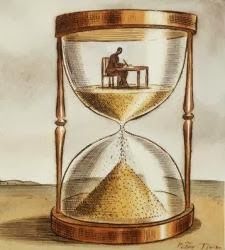Serendipitet
Wislawa
Szymborska
Too Late, or When?

Karel Capek published his famous catastrophic novel in 1936. It was conceived as a warning against the growing power of Hitler's fascism. Hence today we should treat it as a worthy classic, that is, put it on a shelf with other books that were absolutely right in their time - and stop reading it. If we do read it, then only for the sake of its stylistic and conceptual inventiveness. I read The War this way, for fun, some twenty years ago. While I was rereading it now, a cold chill ran up my spine time after time, since the book hasn't aged, unfortunately. What's it about? Some people stumble on a small colony inhabited by an unknown species of amphibian on the shores of some distant island. They also accidentally discover that these friendly-looking monsters are fairly quick-witted and can be taught to perform various underwater tasks, that they acclimate readily to all latitudes, and that, when regularly fed and properly equipped, they can provide the human race with countless benefits. This is the introduction. In the epilogue it turns out that the newts have multiplied beyond count and no longer fit inside the little bays to which they've been assigned. As a result they gradually overflow onto all the continents and sink them into the ocean. Capek fills the space between the introduction, where nothing looks ominous yet, and the epilogue, in which it's too late for any opposition, with the buzz of information. The novel is a parodic montage made up of the most varied kinds of communcation. We get news reports, experts' testimony, and statistics. Interviews, statements, lectures, and polemics. Appeals, proclamations, and manifestos. An ever-growing number of rallies, congresses, briefings, and summit meetings. All on the subject of the newts, in conjuction with the newts, in opposition to the newts, and in defense of the newts. It becomes increasingly clear that there's no possibility of reaching any kind of agreement. As time goes on, moreover, opportunists turn up who work to provide services to the newts. The ranks of those who want only peace and quiet, who've had enough of those damned newts, continue to swell as well. Naturally, there's also no dearth of foresighted individuals warning and exhorting. But, good Lord, in the beginning how can you tell a demented naysayer from a prophet with right on his side? The world is full of all sorts of sleeping powers - but how can you know in advance which may be safely released and which should be kept under lock at all costs? Between the moment when sounding the alarm would be laughably premature and the moment when it's already too late, a single, suitable perfectly timed moment must occur when the misfortune can still be averted. In all the commotion it most often passes unnoticed. But which moment is it? How do we recognize it? This is probably the most painful question posed to human beings by our own history. Dear Mr. Capek, Esteemed Otherworldly Shadow - we still don't have the answer.
About
The War with the Newts by Karel Capek
Non-required
reading: Prose Pieces
Translated by Clare Cavanagh